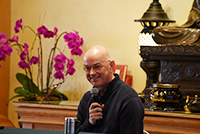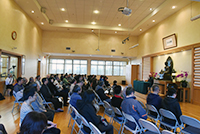Report on a talk on “Chan in Everyday Life” given by Zarko Andricevic

On Saturday, November 21st, there was a Dharma talk at DDVC on “Chan in Everyday Life”, presented by Zarko Andricevic from Croatia, who is a direct Dharma heir of Master Sheng Yen. He explained the cultural differences between China and India that led Chinese monks to abandon the practice of begging and become self-sufficient. The Chinese monastic system left less time for sitting meditation, so meditation began to be incorporated into working, farming and other chores.
In modern times, people tend to do everything in a rush. This creates tension, leading to superficial actions and alienation from our activities. Everything becomes one big chore. He emphasized the importance of bringing Chan practice from the insulated world of the Chan Hall into the chaotic realm of everyday life, this being a key goal of The Path.

Zarko then fielded questions from the audience.
He was asked whether it was acceptable for Dharma teachers in the west to charge fees for Dharma talks and classes. Zarko said that in order to survive in the West, Buddhism must adapt to the economic reality of the West. Running Dharma centres costs money. Rent, utilities, etc. have to be paid for and this is what the fees cover. The Dharma is priceless, but the material infrastructure supporting it costs something.
There was a question about finding out which method of practice is most suitable for you. Zarko’s answer was that methods are antidotes, each method working more specifically on one of the three poisons - greed, hatred, and ignorance. For example, hatred can be overcome by loving-kindness meditation, meditation on impermanence dispels greed, and for a person with strong ignorance he suggests meditation on breath. He added that using breath is the universal method because ignorance is the main source which gives rise to hatred and greed as well.
A question was asked about how to decide which technique -- such as breath counting, hua-tou, and silent illumination -- is best suited for oneself. Zarko replied that, for example, a person with a strong, busy or scattered mind should not use the second stage of silent illumination because this would create more harm than good. He advised to start with a simple method until one has exhausted its benefits, and only then to switch techniques. He compared techniques to routes up a mountain; any route will take you to the top but switching routes will just keep you circling the mountain.
Zarko clarified that if during working meditation you had to think in order to do your task, such thoughts were fine as they were in harmony with the work, otherwise they should be considered as scattered thoughts.
Venerable Chang Wu Fashi concluded by encouraging everyone to take part in the Bodhisattva Precepts ceremony next year.
I was left feeling a sense of fulfillment from the energy and wisdom of the talk.
(Written by Eddy Theodoric)
